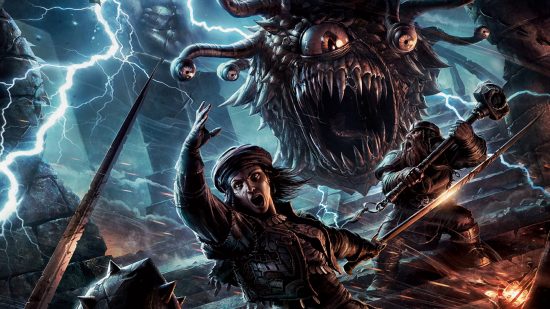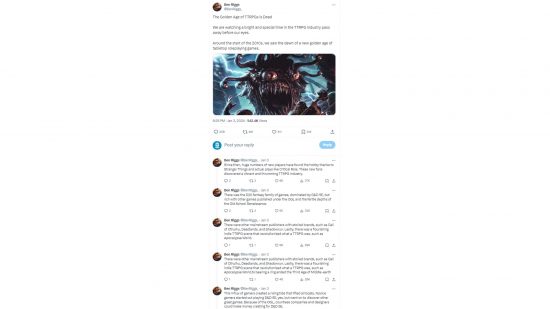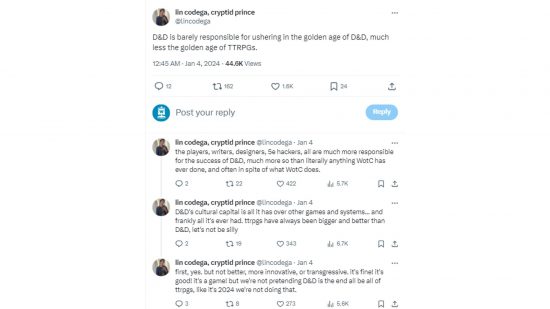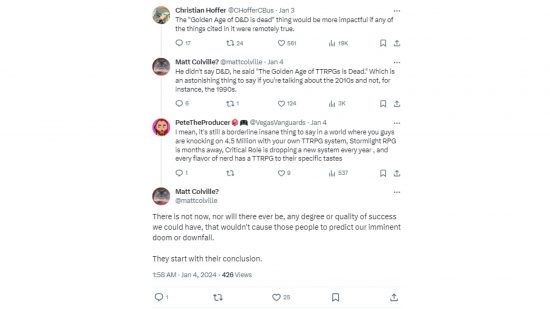A DnD historian has announced that the Golden Age of TTRPGs is over, citing a fracturing of the community in the wake of the OGL debacle. In a controversial (and rather long) Twitter thread on January 3, Ben Riggs, a D&D historian and writer, whose published work appears in Geek and Sundry and Gizmodo, set out his case for why RPGs may be on the decline.
According to Riggs’ argument, the Golden Age of tabletop RPGs was ushered in in the 2010s, with Stranger Things and Critical Role bringing many new fans to DnD. However, he argues that a decline in Dungeon and Dragon’s popularity is imminent, and that a splintering of the fanbase could be a disaster for the hobby as a whole.
The particularly controversial part of Riggs’ thread, which has gained traction fast, surrounds the many new RPG systems that leapt up after proposed changes to the OGL shook the faith of both fan and third-party creator alike. Riggs argues that while games like Kobold Press’s Tales of the Valiant and Matt Colville’s MCDM RPG “grossed million in crowdfunding campaigns” and “all have been positively reviewed” this is not a plus point for the tabletop scene, but instead “signs that the industry has peaked”.
Riggs’ reasoning is that DnD was more than a game, it was a community which multiple businesses could make their living from. While Wizards of the Coast, DnD 3rd party content creators, and games derived from 5e could all share customers, the more varied RPGs that are popping up now won’t be able to.
His predictions are bleak. He argues that ‘6th edition’ won’t be as popular as 5e, which could lead to another round of layoffs at Wizards. And he argues that the diversification of systems will (slightly paradoxically) cause RPGs to “grow less diverse as it becomes even harder to make money in a TTRPG community broken into factions”.
Many popular commentators in DnD Twitter have clapped back at Riggs, disagreeing with his argument. Linda Codega, a journalist and prominent voice in the tabletop sphere – particularly during the OGL incidents last year – criticized Riggs’ DnD-centric point of view, arguing that “D&D is barely responsible for ushering in the golden age of D&D, much less the golden age of TTRPGs.”
Another journalist, Christian Hoffer, pointed out inaccuracies in the thread, like suggesting Critical Role (or for that matter Matt Colville) had dropped D&D. There definitely seem to be some flaws in the argument. For instance, Riggs suggests that it’s “truly inconceivable” that 6th edition would have an OGL or have its rules in Creative Commons.
This is an odd thing to say, since Wizards has released DnD’s basic rules under Creative Commons. And if by 6e Riggs means One DnD, we were under the impression that, after Wizards of the Coast apologized for its boo-boo, the OGL was going to apply to One DnD as well.
The main evidence supporting Riggs’ baleful portent is historical precedent – something Riggs’, as author of ‘Slaying The Dragon: A Secret History of Dungeons and Dragons’, is very familiar with.
Riggs points out that TSR failed because it split its fan base across too many settings and subsystems, and players only purchased their favorites. He suggests this splintering into different games and communities will have an even more destructive impact.
Whether or not a split community was the main reason TSR folded, it’s certainly a view that’s widely believed. For instance, Paizo founder Lisa Stevens once shared on the company’s forums that “the splitting of the customer base is the #1 reason why TSR went out of business”
However, TTRPG creators don’t seem shaken by the case Riggs has made. Matt Colville – mentioned multiple times in the thread – was dismissive of it, saying that 2010-2021 was only a Golden Age for investors and DnD’s owners.
He suggested that Riggs had started from his conclusion and worked backwards, saying: “There is not now, nor will there ever be, any degree or quality of success we could have, that wouldn’t cause those people to predict our imminent doom or downfall.”
For more content, check out our list of all the DnD classes and DnD races. And if you’re looking for handy tools for your tabletop, these are the best DnD character creators and DnD DM screens.



